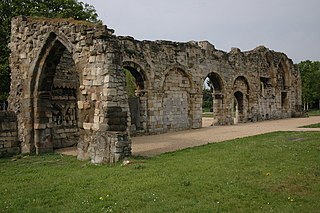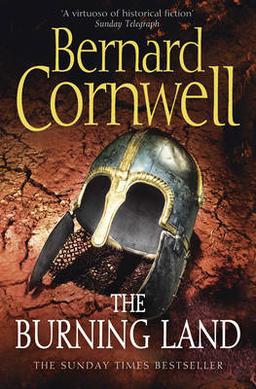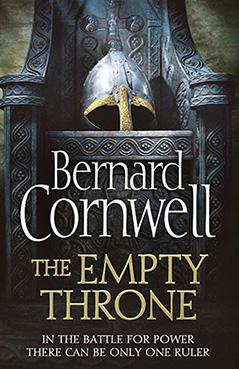Related Research Articles

Mercia was one of the three main Anglic kingdoms founded after Sub-Roman Britain was settled by Anglo-Saxons in an era called the Heptarchy. It was centred on the River Trent and its tributaries, in a region now known as the Midlands of England.

Æthelflæd ruled as Lady of the Mercians in the English Midlands from 911 until her death in 918. She was the eldest child of Alfred the Great, king of the Anglo-Saxon kingdom of Wessex, and his wife Ealhswith.

Æthelred became Lord of the Mercians in England shortly after the death or disappearance of Mercia's last king, Ceolwulf II, in 879. He is also sometimes called the Ealdorman of Mercia. Æthelred's rule was confined to the western half, as eastern Mercia was then part of the Viking-ruled Danelaw. His ancestry is unknown. He was probably the leader of an unsuccessful Mercian invasion of Wales in 881, and soon afterwards he acknowledged the lordship of King Alfred the Great of Wessex. This alliance was cemented by the marriage of Æthelred to Alfred's daughter Æthelflæd.
Ealhswith or Ealswitha was wife to King Alfred the Great. She was one of the most powerful noble women in early medieval England during the time of the Vikings. She was mother to King Edward the Elder who succeeded King Alfred to the Anglo-Saxon throne. Her father was a Mercian nobleman, Æthelred Mucel, Ealdorman of the Gaini, which is thought to be an old Mercian tribal group. Her mother was Eadburh, a member of the Mercian royal family and her lineage was one of the primary reasons for Alfred taking Ealhswith as his wife. Her legacy persists; after her death in the nunnery she founded and in the estates left to her by Alfred.

Ceolwulf I was the King of Mercia, a kingdom of Anglo-Saxon England, from 821 until his deposition in 823. He was the brother of Coenwulf, his predecessor, and was deposed by Beornwulf.
Ælfwynn was the ruler of Mercia as the 'Second Lady of the Mercians' for a few months in 918, following her mother's death on 12 June 918. She was the daughter of Æthelred and Æthelflæd, the rulers of Mercia. Her accession was the only example of rule passing from one woman to another in the early medieval period in the British Isles. Manuscript C of the Anglo-Saxon Chronicle states: "Here also the daughter of Æthelred, Lord of the Mercians, was deprived of all control in Mercia, and was led into Wessex three weeks before Christmas; she was called Ælfwynn." ASC C dates Æthelflæd's death as 12 June 918 and Ælfwynn's deposition to December 919, but most historians revise the deposition to 918. George Molyneux gives the period of Ælfwynn's power as "six or eighteen months". ASC C is the only version of the Chronicle to mention Ælfwynn. Other versions reflect a West Saxon view point and ASC A states that Edward took power in Mercia immediately after Æthelflæd's death, but ASC C includes entries from a lost version called the 'Mercian Chronicle'.
The Battle of Corbridge took place on the banks of the River Tyne near the village of Corbridge in Northumberland in the year 918.
Sydney Fowler Wright was a British editor, poet, science fiction author, writer of screenplays, mystery fiction and works in other genres, as well as being an accountant and a conservative political activist. He also wrote as Sydney Fowler and Anthony Wingrave.

Edward the Elder was King of the Anglo-Saxons from 899 until his death in 924. He was the elder son of Alfred the Great and his wife Ealhswith. When Edward succeeded to the throne, he had to defeat a challenge from his cousin Æthelwold, who had a strong claim to the throne as the son of Alfred's elder brother and predecessor, Æthelred I.

Sword Song is the fourth historical novel in The Saxon Stories by Bernard Cornwell, published in 2007. Uhtred leads battles against the Danes, as King Alfred strengthens the defences of his kingdom of Wessex.

Æthelswith was the only known daughter of King Æthelwulf of Wessex. She married King Burgred of Mercia in 853. The couple had no known issue.
Æthelflæd is an Anglo-Saxon female name meaning "noble beauty". Notable people with the name include:
Ælfflæd or Æthelflæd is not recorded before the twelfth century. William of Malmesbury describes Æthelflæd as the daughter of King Ceolwulf I of Mercia, wife of King Wiglaf's son Wigmund, and mother of Wigstan.

The Burning Land is the fifth historical novel in The Saxon Stories by Bernard Cornwell, published in 2009. The story is set in the 9th-century Anglo-Saxon kingdoms of Wessex, Northumbria and Mercia. The first half of season 3 of the British television series The Last Kingdom is based on this novel.

St Oswald's Priory was founded by Æthelflæd, daughter of Alfred the Great, and her husband Æthelred, ealdorman of Mercia, in the late 880s or the 890s. It appears to have been an exact copy of the Old Minster, Winchester It is a Grade I listed building.

Death of Kings, published in 2011, is the sixth novel of Bernard Cornwell's Saxon Tales series. It continues the story of Saxon warlord Uhtred of Bebbanburg who resists a new Danish invasion of Wessex and Mercia.

The Pagan Lord is the seventh historical novel in the Saxon Stories by Bernard Cornwell, first published in 2013. The story is set in the early 10th century in Anglo-Saxon Mercia and Northumbria.

The Empty Throne is the eighth historical novel in The Saxon Stories series by Bernard Cornwell, first published in October 2014. It is set in 10th-century Mercia and Dyfed.

The Flame Bearer is the tenth historical novel in The Saxon Stories series aka The Last Kingdom series by Bernard Cornwell, first published in October 2016. It is set in 10th-century England and continues to follow the fortunes of the fictional Uhtred of Bebbanburg. In this novel Uhtred sets out to finally regain his childhood home, Bebbanburg, which is now held by his cousin.
The Battle of Benfleet was an 894 battle between the Vikings and the Anglo-Saxons commanded by Edward the Elder and Æthelred, Lord of the Mercians, the son and son-in-law of Alfred the Great respectively. The battle was part of a campaign started by the Vikings in 892 to raid and potentially occupy lands in England, having been defeated by the armies of France. As part of this campaign the invaders were supported by those Vikings who had settled in England following an earlier invasion launched in 865. The battle was a victory for the Anglo-Saxons who successfully captured a number of women and children, as well as capturing or destroying the Viking ships.
References
- ↑ Baker, Ernest A., A Guide to Historical Fiction. London : G. Routledge and Sons, 1914. (p.9)
- ↑ "Thorkeld and Elfwin and Ethelfleda are first-rate characters, as much as you can ask for in one novel; it does not greatly matter that Sithric is little more than the conventional juvenile lead. Mr. Wright does his pictures and his narrative with vigor and economy..." Elmer Davis, "She Knew What She Wanted" (Review of Elfwin by S. Fowler Wright), The Saturday Review, September 13, 1930, (p. 123).
- ↑ Holly Koelling, Best Books for Young Adults. American Library Association, 2007. ISBN 9780838935699 (p. 255)
- ↑ "Review: The Bone Thief by V M Whitworth" Review by S. Garside Neville". Historical Novel Society. Retrieved 16 July 2019.
- ↑ "Review: To Be a Queen by Annie Whitehead" Review by S. Helen Hollick. Historical Novel Society. Retrieved 18 March 2020.
- ↑ "Review: Daughters of Time edited by Mary Hoffman" Review by Elizabeth Hawksley. Historical Novel Society. May 2014. Retrieved 29 March 2020.
- ↑ "The Last Kingdom – Aethelflaed". BBC Two . Retrieved 12 June 2018.